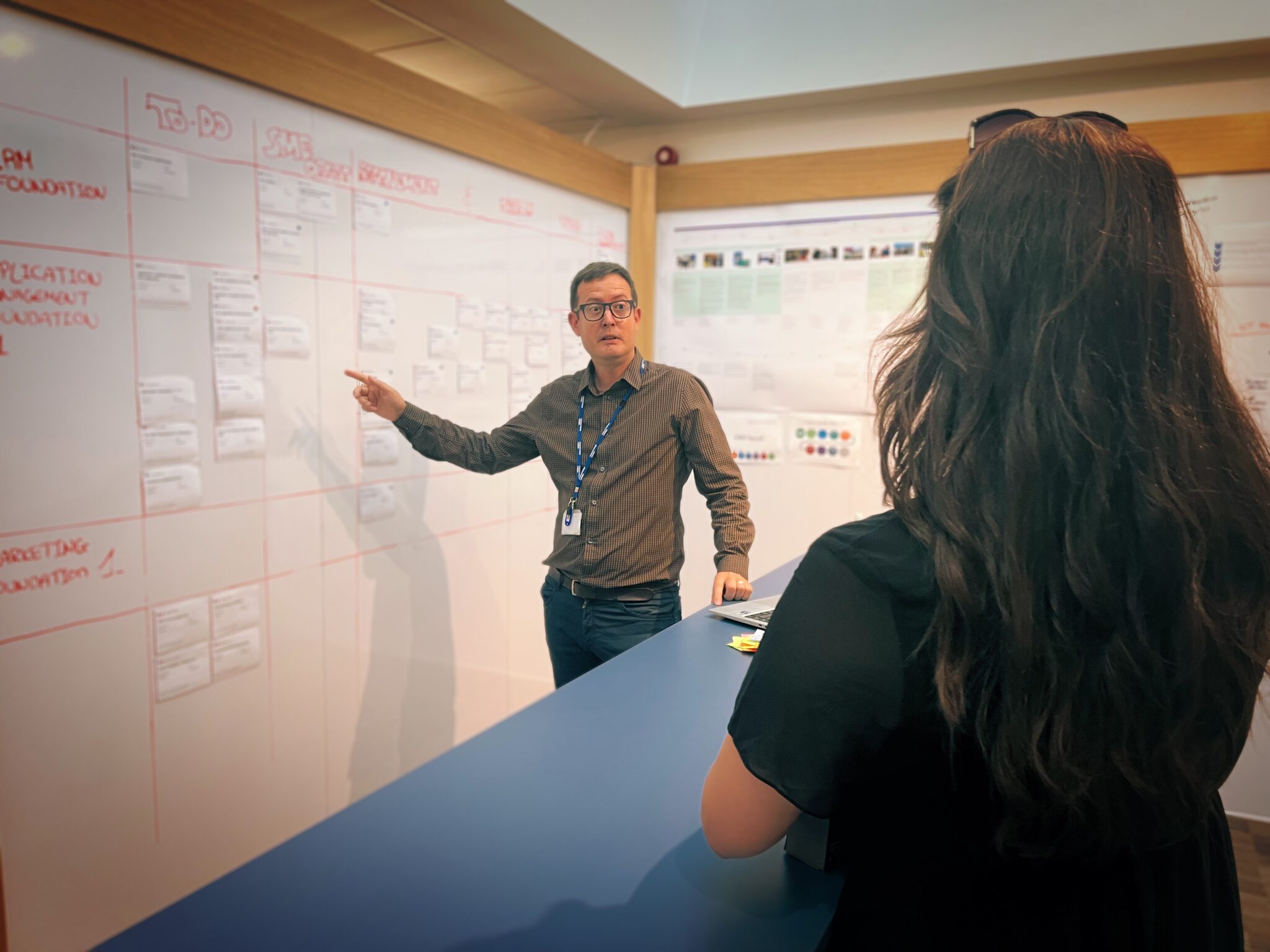
As Datacentre Lead at Imperial College London, – Iain Darvell delivers complex and essential IT projects around infrastructure integration, data centre migrations and Cloud computing that allow the university to lead the way in STEM research. Having joined Imperial four years ago, he is passionate about diversifying the pipeline to bring new talent to IT teams. We talk to him about the exciting possibilities of data and Cloud computing and the opportunities at Imperial to kick-start or accelerate a career in technology.
What is your role, and how does it support Imperial as a world-class research facility?
I lead a technical team of engineers who look after the physical posting, racking and stacking of devices and provide services such as storage and backup, alongside supporting the server operating systems. Recently we’ve also started looking after the Cloud functions that the university relies on too. The Datacentre is pretty much the bottom of the stack, with core infrastructure and different applications, web services or databases all sitting on top. Imperial does a lot of research on research-computing, including its infrastructure and IT services. Our Department of Computing, for example, is a world leader in machine learning and artificial intelligence, and, as a result, we have to be very flexible. We can’t just offer standard corporate services because that’s not what the university needs. This has meant that the scope, experience and the skills I draw on in my role have widened considerably.
What’s the biggest misconception about a career in tech and why?
Obviously, the traditional perception is nerdy middle-aged blokes hiding behind their computers. When I started my career 20 years ago, that wasn’t just the perception; it was almost the expectation. But the IT landscape is completely different today. As the Datacentre is at the bottom of the stack, we need people who can now talk to the end users. We need to understand the new business requirements from a research perspective, so we can provide equipment that allows people to do their research and for them to be able to teach. A good example was during COVID-19, when critical research was only possible with the IT team running the high-performance computing environments behind it.
What, for you, is key to success in a role in tech?
Before Cloud computing came around, a new server or operating system would come out, or a storage device vendor would update their products, every few years, but the rate of change is far quicker now. New functions and services in IT evolve month by month. Certainly, when we talk about the practical opportunities that we have in the team at Imperial, we are looking for people who are looking to use their skill sets but, crucially, who are receptive and really interested in learning because it’s being able to keep pace with that quick turnaround in technology that is key.
How is Imperial College London encouraging more women to enter the tech industry?
Imperial is a university with a world-class reputation in STEM subjects, so it’s our business to encourage everyone into technology and engineering subjects. We need to ensure our classrooms and workforces of the future are as diverse as possible so we can find solutions that will benefit all of society. If we don’t empower and motivate women to progress their careers in IT, we’re missing out on a whole community of problem solvers. Throughout Imperial, we support and celebrate the achievements of women through events and initiatives, including our Women@Imperial week. We also have dedicated EDI Champions within ICT whose role is to find ways of removing barriers and highlighting ways to continue to create a culture of equity. Partnering with organisations like everywoman also helps us to create a network of empowered women who are motivated to progress their careers. We see much better female representation in developers, coders, on the service operations side or as project managers than in infrastructure and the Datacentre. However, at present, this hasn’t got as much coverage or been highlighted, and that’s something I am working to change.
Which talent pools are still underused by the industry, and how is Imperial addressing this?
When I started in IT, the expectation was that you had to have a degree in computer science or an equivalent, but university isn’t right—or financially possible—for everyone. Imperial is leading the way to challenge this barrier through our Apprenticeship Scheme, which is open to people from all backgrounds and genders. It’s a great example of where we’re really moving to get more diversity in tech in practical and impactful ways. By creating in-house training and progression, we are reducing our skills gap too, and we currently have 20 young people (aged 18-to-25) working under our apprenticeship scheme in the IT department. It’s an important opportunity for those who don’t necessarily have a traditional education.
What one change could really encourage a more diverse tech pipeline?
Job advertisements need to be written in a more clearly consumable form. Traditionally, job adverts in tech are often just a list of bullet points of programming languages or experience with products, and the roles need to be communicated in a different way. We need to get across clearly what we want in a person and to tell them about the role on all levels to spark interest. This way, we can also generate more applications from people who don’t think they hit all the boxes but have real potential.
What skills do you look for in new starters that join your team?
People who succeed in IT are problem solvers, inquisitive by nature, and they want to improve things for our customers. We’re here to constantly try to improve the service and experience for our staff and students, and it’s up to our people to constantly look, innovate, and question. Potential is just as important as skillset in a newcomer. We want to invest in people with the potential to learn, so we’re not going to close the door on anybody just because they don’t tick all the boxes for the technologies that we currently use. The great thing about working at Imperial is the way learning and development is promoted too. We develop from within, so the opportunities for everybody in ICT are head and shoulders above anywhere else I’ve worked, both in terms of developing technical skills and in soft skills such as management, teamwork and problem-solving.
What advice would you give to women looking to start a career in tech?
There is so much self-learning material out there nowadays that can act as a gateway into technology—gone are the days when you had to pay thousands for a course. Microsoft and Amazon offer free Cloud computing training content, for example, and with self-directed learning you can do it at your own pace. There are even free courses that lead to qualifications. In addition, there are YouTube channels devoted to particular technologies and there are third parties such as the IT Academy and LinkedIn Learning to explore too. So, my advice would be to just start learning. For people who want to start a career in tech, self-learning is by far the easiest way to demonstrate that you’re the type of person who has the potential to succeed.
To discover new job opportunities at Imperial College London career’s website, click here.



